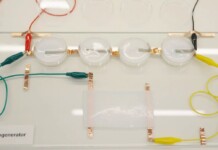Clean Cities coalitions around the nation saved the equivalent of 375 million gallons of gasoline in 2006 — 50 percent more than the 250 million gallons in 2005 — by transforming government and private vehicle fleets into more energy efficient, cleaner burning forms of transportation.
According to a recent report from the U.S. Department of Energy’s National Renewable Energy Laboratory, if current progress
continues, Clean Cities coalitions will be on track to reach 3.2 billion gallons of gasoline saved in 2020, exceeding their established goal by 700 million gallons.
Clean Cities, as part of the Office of Energy Efficiency and Renewable Energy, has a network of 90 volunteer coalitions, which develop public/private partnerships to promote alternative fuels and advanced vehicles, fuel blends, fuel economy, hybrid vehicles, and idle reduction.
According to the recent report:
- Alternative fuel provided 71 percent of the 2006 gasoline savings. 30 percent of that was from the use of compressed natural gas, mostly in heavy-duty vehicles.
- The use of E85, a blend of 85 percent ethanol and 15 percent gasoline, grew substantially in 2006, largely because the number of E85 stations doubled – from 436 to 995 – in the year. E85 accounted for 24 percent of gasoline displacement from alternate fuels in 2006.
- 44,000 hybrid electric vehicles were acquired in 2006, a 61 percent increase over the 17,100 HEVs purchased in 2005. HEV use accounted for the displacement of approximately 9 million gallons of gasoline.
- Idle reduction efforts saved 8.4 million gallons of gas in 2006, including 1.2 million gallons from truck stop electrification.
- Almost 2 million gallons were saved by reducing the number of miles traveled.
"The significant progress Clean Cities made in 2006 shows impressive commitment by our coalition members," Department of Energy (DOE) Clean Cities Director, Dennis A. Smith said.
The study was compiled from voluntary reports that represent a subset of the activities going on throughout the nation and indicates the impact of the coalitions and their priorities.
Through its almost 90 coalitions, Clean Cities works with government and industry partners (local, state and federal agencies; public health and transportation departments; transit agencies and other government offices; as well as auto manufacturers, car dealers, fuel suppliers, public utilities, public and private fleets, community business groups and professional associations) to increase the nation’s economic, environmental and energy security by reducing petroleum consumption in the transportation sector.
Clean Cities addresses the challenge of moving the United States away from the infrastructure and practices that contribute to dependence on imported petroleum and toward energy independence and security within the Vehicle Technologies Program of DOE’s Office of Energy Efficiency and Renewable Energy.



















